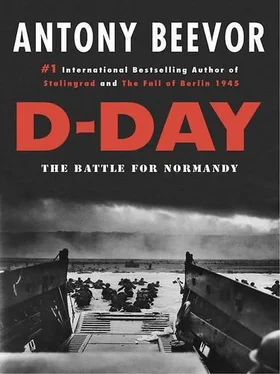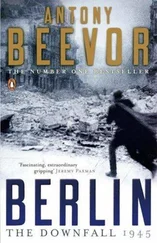They argued round and round until time ran out. Stagg hurried to the library in the main house to present a report to all the key commanders for Overlord.
‘Well, Stagg,’ Eisenhower said. ‘What have you got for us this time?’
Stagg felt compelled to follow his own instinct and overlook the more optimistic views of his American colleagues at Bushey Park: ‘The whole situation from the British Isles to Newfoundland has been transformed in recent days and is now potentially full of menace.’ As he went into detail, several of the senior officers glanced out of the window at the beautiful sunset in slight bewilderment. [1] It was still light because they were operating on double British summertime.
After questions about the weather for the airborne drops, Eisenhower probed further about the likely situation on 6 and 7 June. There was a significant pause, according to Tedder. ‘If I answered that, Sir,’ Stagg replied, ‘I would be guessing, not behaving as your meteorological adviser.’
Stagg and his American counterpart, Colonel D. N. Yates, withdrew, and soon General Bull came out to tell them that there would be no change of plan for the next twenty-four hours. As they returned to their tented sleeping quarters, the two men knew that the first ships had already left their anchorages. Stagg could not help thinking of the black joke made to him by Lieutenant General Sir Frederick Morgan, the initial chief planner of Overlord. ‘Good luck, Stagg. May all your depressions be nice little ones, but remember we’ll string you up from the nearest lamp post if you don’t read the omens aright.’
Early the next morning, Saturday, 3 June, the news could hardly have been worse. The weather station at Blacksod Point in western Ireland had just reported a rapidly falling barometer and a force six wind. Stagg felt ‘all but physically nauseated’ by the weather charts and the way the teams still analysed the same data in different ways. That evening, at 21.30 hours, he and Yates were summoned. They entered the library, its shelves emptied of books. Mess armchairs were arranged in concentric arcs, with commanders-in-chief in the front row and their chiefs of staff and subordinate commanders behind. Eisenhower, his chief of staff, General Walter Bedell Smith, and Tedder sat on three chairs facing the audience.
‘Gentlemen,’ Stagg began. ‘The fears my colleagues and I had yesterday about the weather for the next three or four days have been confirmed.’ He then launched into a detailed forecast. It was a gloomy picture of rough seas, winds up to force six and low cloud. ‘Throughout this recital,’ Stagg wrote later, ‘General Eisenhower sat motionless, with his head slightly to one side resting on his hand, staring steadily towards me. All in the room seemed to be temporarily stunned.’ Not surprisingly, Eisenhower felt compelled to recommend a provisional postponement.
It was not a good night for Eisenhower. His aide, Commander Harry Butcher, came to him later with the news that Associated Press had put out a tape stating, ‘Eisenhower’s forces are landing in France.’ Even though the agency cancelled the story twenty-three minutes later, it had been picked up by CBS and Radio Moscow. ‘He sort of grunted,’ Butcher noted in his diary.
When Stagg went off to his tent at about midnight, having heard of the provisional postponement, it was strange to look up between the trees and see that ‘the sky was almost clear and everything around was still and quiet’. Stagg did not attempt to sleep. He spent the early hours of the morning writing up detailed notes of all discussions. When he had finished the forecast was no better, even though outside all remained calm.
At 04.15 hours on the Sunday, 4 June, at yet another meeting, Eisenhower decided that the twenty-four-hour postponement provisionally agreed the night before must stand. Without maximum air support, the risks were too great. The order went out to call back the convoys. Destroyers set to sea at full speed to round up landing craft which could not be contacted by radio and shepherd them back.
Stagg, who had then gone back to his camp bed exhausted, was taken aback when he awoke a few hours later to find that the sky was still clear and there seemed to be little wind. He could not face the other officers at breakfast. But later in the day he felt a certain shamefaced relief when the cloud and wind began to increase from the west.
That Sunday was a day of endless questions. Surely the tens of thousands of men could not be kept cooped up on their landing craft? And what of all the ships which had put to sea and had now been ordered back? They would need to refuel. And if the bad weather were to continue, then the tides would be wrong. In fact, if conditions did not improve within forty-eight hours, Overlord would have to be postponed for two weeks. Secrecy would be hard to maintain and the effect on morale could be devastating.
2. Bearing the Cross of Lorraine
Eisenhower was far from being the only one to be awed by the enormity of what they were launching. Churchill, who had always been dubious about the whole plan of a cross-Channel invasion, was now working himself up into a nervous state of irrational optimism, while Field Marshal Sir Alan Brooke confided to his diary that there was ‘an empty feeling at the pit of one’s stomach’. ‘It is very hard to believe that in a few hours the cross Channel invasion starts! I am very uneasy about the whole operation. At the best it will fall so very very far short of the expectation of the bulk of the people, namely all those who know nothing of its difficulties. At the worst it may well be the most ghastly disaster of the whole war.’
‘The British,’ observed a key American staff officer, ‘had a much greater fear of failure.’ This was hardly surprising after the long years of war, with bitter memories of Dunkirk and the ill-fated Dieppe raid. Yet whatever their reasons, they were right to have refused to invade the Continent any earlier. An overwhelming superiority was necessary, and the US Army had had many harsh lessons to learn in North Africa, Sicily and Italy.
Churchill once remarked that the Americans always came to the right decision, having tried everything else first. But even if the joke contained an element of truth, it underplayed the fact that they learned much more quickly than their self-appointed tutors in the British Army. They were not afraid to listen to bright civilians from the business world now in uniform and above all they were not afraid to experiment.
The British showed their ingenuity in many fields, from the computer which decoded Ultra intercepts to new weapons such as Major General Percy Hobart’s swimming tanks and mine-clearing flails. Yet the British Army hierarchy remained fundamentally conservative. The fact that the special tanks were known as Hobart’s ‘funnies’ revealed that inimitable blend of British scepticism and flippancy. The cult of the gentleman amateur, which Montgomery so detested, would continue to prove a considerable handicap. Not surprisingly, American officers regarded their British counter parts as ‘too polite’ and lacking a necessary ruthlessness, especially when it came to sacking incompetent commanders.
Churchill himself was a great gentleman amateur, but nobody could accuse him of lacking drive. He took a passionate interest in military operations — in fact rather too much, in the view of his military advisers. A stream of ideas, most of them utterly impractical, poured forth in memos that produced groans and sighs in Whitehall. General ‘Pug’ Ismay, Churchill’s military adviser, had to deal with the Prime Minister’s latest inspiration at this historically symbolic moment. Churchill wanted to ‘display some form of “reverse Dunkirk” for Overlord with small [civilian] boats landing infantry to follow up and supplement proper assault troops after beaches have been cleared’.
Читать дальше











